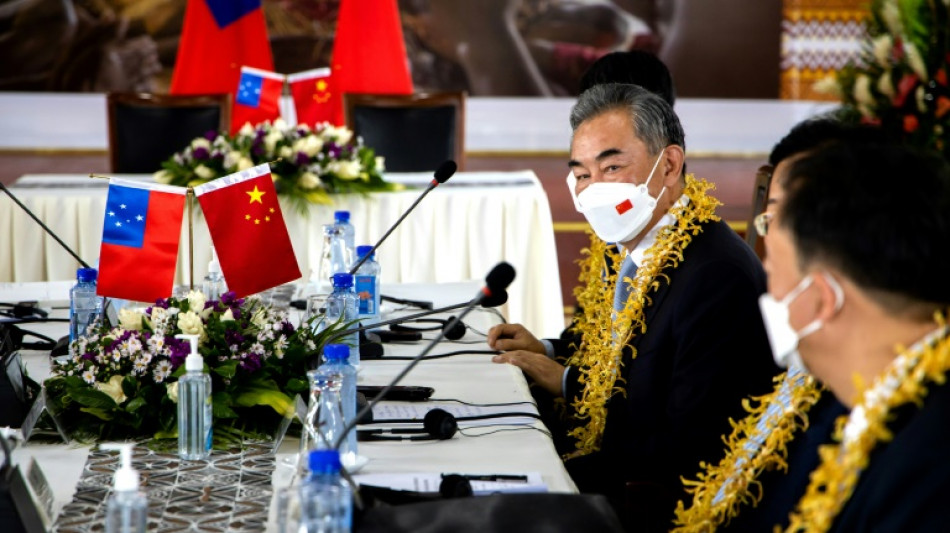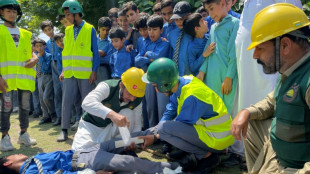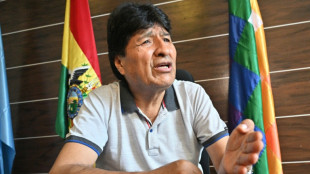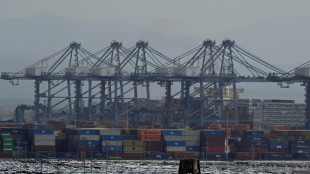
-
 Bangladesh begins three days of mass political rallies
Bangladesh begins three days of mass political rallies
-
Children learn emergency drills as Kashmir tensions rise

-
 Millions of children to suffer from Trump aid cuts
Millions of children to suffer from Trump aid cuts
-
Veteran Wallaby Beale set for long-awaited injury return

-
 Syria's Druze take up arms to defend their town against Islamists
Syria's Druze take up arms to defend their town against Islamists
-
Tesla sales plunge further in France, down 59% in April

-
 US calls on India and Pakistan to 'de-escalate'
US calls on India and Pakistan to 'de-escalate'
-
Israel reopens key roads as firefighters battle blaze

-
 Europe far-right surge masks divisions
Europe far-right surge masks divisions
-
James will mull NBA future after Lakers playoff exit

-
 Ukraine's chief rabbi sings plea to Trump to side with Kyiv
Ukraine's chief rabbi sings plea to Trump to side with Kyiv
-
Australian mushroom meal victim 'hunched' in pain, court hears

-
 Lakers dumped out of playoffs by Wolves, Rockets rout Warriors
Lakers dumped out of playoffs by Wolves, Rockets rout Warriors
-
Booming tourism and climate change threaten Albania's coast

-
 US reaching out to China for tariff talks: Beijing state media
US reaching out to China for tariff talks: Beijing state media
-
Tariffs prompt Bank of Japan to lower growth forecasts

-
 Kiss faces little time to set Wallabies on path to home World Cup glory
Kiss faces little time to set Wallabies on path to home World Cup glory
-
Serbian students, unions join forces for anti-corruption protest

-
 Slow and easily beaten -- Messi's Miami project risks global embarrassment
Slow and easily beaten -- Messi's Miami project risks global embarrassment
-
Fan in hospital after falling to field at Pirates game

-
 Nuclear power sparks Australian election battle
Nuclear power sparks Australian election battle
-
Tokyo stocks rise as BoJ holds rates steady

-
 Bank of Japan holds rates, lowers growth forecasts
Bank of Japan holds rates, lowers growth forecasts
-
'Sleeping giants' Bordeaux-Begles awaken before Champions Cup semis

-
 Napoli eye Scudetto as Inter hope for post-Barca bounce-back
Napoli eye Scudetto as Inter hope for post-Barca bounce-back
-
Germany's 'absolutely insane' second tier rivalling Europe's best

-
 PSG minds on Arsenal return as French clubs scrap for Champions League places
PSG minds on Arsenal return as French clubs scrap for Champions League places
-
UK WWII veteran remembers joy of war's end, 80 years on

-
 Myanmar junta lets post-quake truce expire
Myanmar junta lets post-quake truce expire
-
Rockets romp past Warriors to extend NBA playoff series

-
 Messi, Inter Miami CONCACAF Cup dream over as Vancouver advance
Messi, Inter Miami CONCACAF Cup dream over as Vancouver advance
-
UN body warns over Trump's deep-sea mining order

-
 UK local elections test big two parties
UK local elections test big two parties
-
US judge says Apple defied order in App Store case

-
 Seventeen years later, Brood XIV cicadas emerge in US
Seventeen years later, Brood XIV cicadas emerge in US
-
Scorching 1,500m return for Olympic great Ledecky in Florida

-
 Israel's Netanyahu warns wildfires could reach Jerusalem
Israel's Netanyahu warns wildfires could reach Jerusalem
-
Istanbul lockdown aims to prevent May Day marches

-
 Formation Metals Announces Appointment of Adrian Smith to Advisory Committee
Formation Metals Announces Appointment of Adrian Smith to Advisory Committee
-
Cerrado Gold Announces Q4 And Annual 2024 Financial Results

-
 Australian guard Daniels of Hawks named NBA's most improved
Australian guard Daniels of Hawks named NBA's most improved
-
Mexico City to host F1 races until 2028

-
 Morales vows no surrender in bid to reclaim Bolivian presidency
Morales vows no surrender in bid to reclaim Bolivian presidency
-
Ukraine, US sign minerals deal, tying Trump to Kyiv

-
 Phenomenons like Yamal born every 50 years: Inter's Inzaghi
Phenomenons like Yamal born every 50 years: Inter's Inzaghi
-
Ukraine, US say minerals deal ready as Kyiv hails sharing

-
 Global stocks mostly rise following mixed economic data
Global stocks mostly rise following mixed economic data
-
O'Sullivan says he must play better to win eighth snooker world title after seeing off Si Jiahui

-
 Sabalenka eases past Kostyuk into Madrid Open semis
Sabalenka eases past Kostyuk into Madrid Open semis
-
Netflix's 'The Eternaut' echoes fight against tyranny: actor Ricardo Darin


China fails to ink security pact with Pacific nations
Talks between Chinese Foreign Minister Wang Yi and 10 Pacific Island nations failed to reach an agreement on a wide-ranging security deal Monday, after sharp warnings the proposal would push the region into "Beijing's orbit".
A virtual summit of leaders and foreign ministers was expected to discuss proposals to radically increase China's involvement in the security, economy and politics of the South Pacific.
But the effort appeared to have fallen short after some regional leaders voiced deep concern.
"As always, we put consensus first," co-host and Fijian Prime Minister Frank Bainimarama said after the meeting, indicating that broad agreement would be needed before inking any "new regional agreements".
Wang is in the Fijian capital Suva as part of a 10-day diplomatic blitz, as Beijing jostles with Washington and its allies over influence in the strategically vital Pacific.
Ahead of his visit, China proposed a pact that would see Beijing train Pacific Island police, become involved in cybersecurity, expand political ties, conduct sensitive marine mapping and gain greater access to natural resources on land and in the water.
As an enticement, Beijing offered millions of dollars in financial assistance, the prospect of a China-Pacific Islands free trade agreement and access to China's vast market of 1.4 billion people.
China has pitched itself to the South Pacific as a "major developing country" that stands shoulder to shoulder with small and medium-sized nations.
Before the meeting, President Xi Jinping sent a message that China would be "a good brother" to the region and that they shared a "common destiny", according to state broadcaster CCTV.
But in a letter to other regional leaders, President of the Federated States of Micronesia David Panuelo warned the proposed agreement was "disingenuous" and would "ensure Chinese influence in government" and "economic control" of key industries.
Following Monday's closed-door meeting, Wang did not cite the proposed "Common Development Vision" document directly, but said the two sides would "continue to have ongoing and in-depth discussions and consultations to shape more consensus on cooperation."
He added: "China will release its own position paper" highlighting "our own positions and propositions and cooperation proposals with Pacific Island countries".
Wang instead announced that 10 Pacific Island nations had agreed on memorandums of understanding on China's "Belt and Road" infrastructure initiative and urged those worried by Beijing's intentions not to be "too anxious and don't be too nervous".
- Balancing act -
Western powers have bristled against China's move into the region, with the US State Department warning South Pacific nations to be wary of "shadowy, vague deals with little transparency".
Australia joined the United States in urging a spurning of China's attempts to expand its security reach deep into the region, with the country's new foreign minister warning of the "consequences" of such deals.
Many in the Pacific are keen to maintain amicable ties with China, balancing relations between Beijing and Washington while focusing on the more urgent threat of climate change and day-to-day economic issues.
During a joint appearance with Wang, Bainimarama hit out at those engaged in "geopolitical point-scoring" that "means less than little to anyone whose community is slipping beneath the rising seas, whose job has been lost to a pandemic or whose family is impacted by the rapid rise in the price of commodities".
All but a few of the Pacific Islands are low-lying and deeply vulnerable to sea-level rises caused by climate change.
P.Mathewson--AMWN